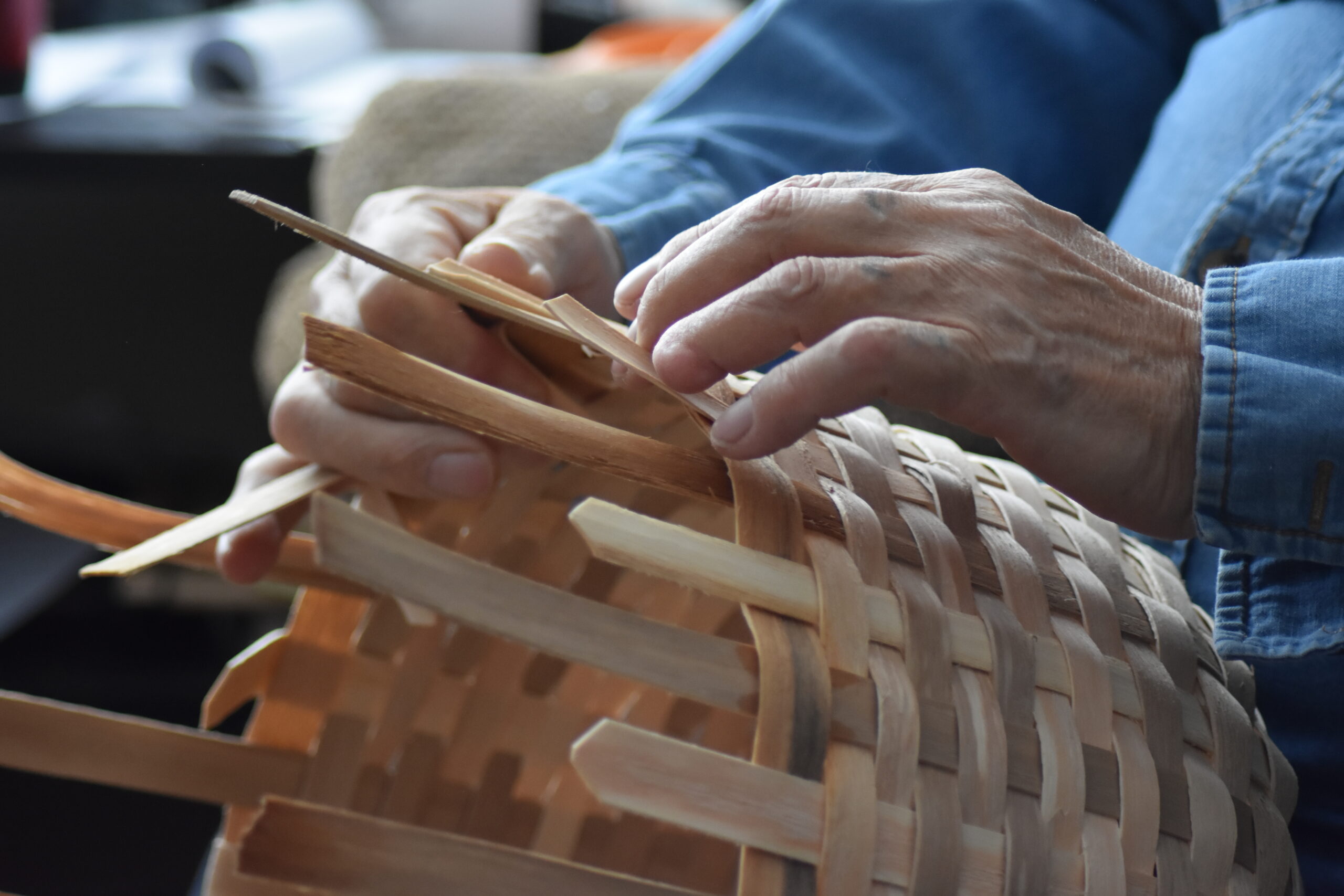
LITTLETON, Maine – There is an ancestral rhythm to the pounding of the ash tree as the basket maker works. Without those who pound the ash, there would be no traditional baskets.
And as Mi’kmaq Nation Vice Chief Richard Silliboy pounds the heartwood of the ash tree with the back of an ax inside his Littleton studio, he is preserving the art of his people.
When Silliboy, 76, went out into the community to survey the basket makers while working for the Mi’kmaq Nation, he realized that only a few were able to go out and get their own wood and most were buying the wooden splints for weaving.
“I realized that It’s a dying art and there are only a few families up here who know how to get the wood,” he said. “If these few families pass away, who is going to make the baskets and who’s going to teach others? I said, ‘I know how to do this.’”
That was over 30 years ago and since that time, the ancient art he learned from his mother has been an enduring part of his life, much like it was for the Mi’kmaq people since the earliest of times.

Basket making, the oldest artform in the Northeast, has been a part of Silliboy’s cultural heritage forever. In a time when Maine’s native people are seeking sovereignty and reclamation of language, traditions and land, valuing and keeping alive ancestral artistic expression after generations of attempted erasure is critical to the nation’s future, according to the Native Arts and Cultural Foundation.
“We started out with birchbark, we used birchbark for housing, wigwams, canoes and boxes. We carried our things in birchbark boxes, we cooked our food in birchbark boxes. We made baskets for our own benefits,” Silliboy said. “But when the Europeans came in, it became an economic thing. First it was barter trade for food and metal tools and then we started making baskets for fisheries and in this area for potatoes.”
Silliboy’s mother, Mary Ann Silliboy, supplied many of the potato baskets for picking in the 1950s.
Back then, the County grew about 250,000 acres of potatoes and it took about 19,000 people to harvest the potatoes by hand in six weeks, Silliboy said.
“All those people had to have a potato basket and mother and the boys (his brothers) used to make about 10 dozen potato baskets a week during the winter months,” he said. “She would sell them for 50 cents apiece. There are about four large baskets to a three bushel barrel,” he said.
By the time he was 10, Silliboy would go to the forest with his mother to get cedar for fancy baskets they would sell door-to-door.
Making even one basket is a lot of work and Silliboy shares a story about an anthropologist who followed two basket makers for the entire time it took to use up all the wood they harvested on the first day. The male basket maker would go out in the morning to get brown ash and he did the splinting. The woman would take over and split and weave. The anthropologist discovered that the entire process of making one basket took nine hours.
About six years ago, with the urging of some friends and community contacts, Silliboy set out to make the largest potato basket in the world. The Maine Community Foundation and private donations supported the project. And with the help of his family, Silliboy started the basket on a Saturday, worked eight to 10 hours a day, and he finished three weeks later.

The over seven-foot tall basket, including the handle, is now in the Aroostook County Agricultural Museum. It is five-feet around at the top.
Silliboy worked with two-inch splints and he had to purchase a four-pound sledge hammer to pound it for the splints for the large basket, he said.
A basket starts with an ash tree. Silliboy divides the log, the size varies, into quarters making a pie-shape section. He removes the heartwood, the dead, central part of the tree, and with a draw knife squares it off before pounding. When he pounds the wood, the fibers between the tree’s growth rings break and slowly, individual separated layers of the tree appear, like strips. These strips are called splints.
The annual growth of the tree determines how thick the splint will be and if the tree gets lots of nutrients in the spring, the splint will be thicker and he may have to split that again.
To begin the actual basket, Silliboy initially lays down eight splints, weaving them and then he ties in a second bottom made into a spiral. That gives the basket a sturdy double bottom.
For a time Silliboy owned Three Feathers Native Baskets and Crafts in downtown Houlton, but after several years he realized that most of his sales were on the road and he began making baskets from home. He sells at the Common Ground Fair and others in the area, but most of his sales come from word of mouth referrals, he said.
“Working with the brown ash I sit out there. I turn on the music, turn the furnace up and weave baskets. It’s so peaceful,” he said.
Basket making is often a respite from all his other tribal responsibilities. Silliboy serves on eight different boards of directors in addition to his Vice Chief role.
“Everybody tells me I’ve to slow down, but at this age if I slow down I might come to a stop,” he said, adding that he will be 77 in 50 days.
The pounding of the basket maker’s ax is like a heartbeat and the brown ash is part of the Mi’kmaq creation story, he said.
“The creator made the blue sky and created the rocks and trees and animals and realized he needed somebody to take care of mother earth and the animals. So he shot an arrow in a brown ash tree and out came the natives singing and dancing,” Silliboy said.






